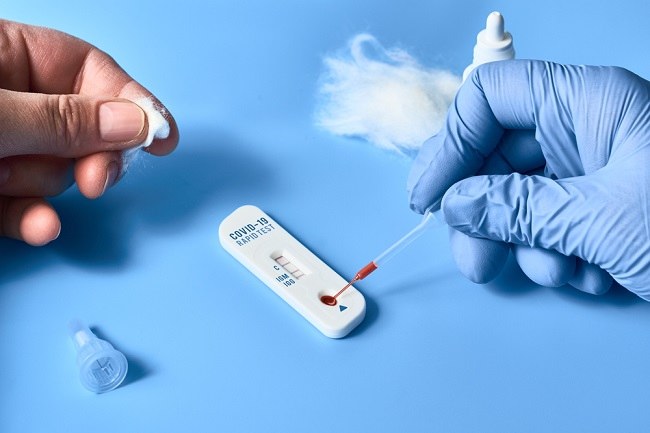Aripiprazole is a medication to relieve and control symptoms mental disorders psychosis due to schizophrenia. In addition, this drug is also used in medicine bipolar disorder or depression.
Aripiprazole works by restoring the balance of natural chemicals in the brain that affect mood and behavior. This way, symptoms of schizophrenia, such as hallucinations, sudden changes in emotions, or disturbances in behavior and thinking, can subside.

Aripiprazole can also be used to control symptoms of Tourette's syndrome or behavioral disorders associated with autism syndrome in children. Please note that this drug should not be used to treat psychosis due to dementia.
Aripiprazole trademark: Abilify, Arinia, Aripi, Aripiprazole, Aripraz, Ariski, Avram, Zipren, Zonia
What is Aripiprazole
| group | Prescription drugs |
| Category | Antipsychotic |
| Benefit | Relieves symptoms of schizophrenia, bipolar disorder, depression, controls symptoms of Tourette's syndrome or behavioral disorders due to autism |
| Used by | Adults and children over the age of 13 years to treat schizophrenia symptoms |
| Aripiprazole for pregnant and lactating women | Category C: Animal studies have shown adverse effects on the fetus, but there are no controlled studies in pregnant women. The drug should only be used if the expected benefit outweighs the risk to the fetus. Apiprazole can be absorbed into breast milk. If you are breastfeeding, do not use this medicine without consulting your doctor first. |
| Shape | Tablet, oral solution, inject |
Precautions Before Using Aripiprazole
Aripiprazole should only be used as prescribed by a doctor. There are several things that must be considered before using this drug, including:
- Do not use aripiprazole if you are allergic to this drug. Tell your doctor about any allergies you have.
- Tell your doctor if you have or are currently suffering from heart disease, heart rhythm disturbances, heart attack, stroke, hypotension, kidney disease, liver disease, high cholesterol, blood clotting disorders, dementia, sleep apnea, or seizures.
- Tell your doctor if you or a family member has diabetes or a mental disorder, such as bipolar disorder or obsessive-compulsive disorder.
- Do not drive a vehicle or perform activities that require alertness while you are taking aripripazole, as this medicine can cause dizziness and drowsiness.
- Do not stop taking aripripazole suddenly without consulting your doctor first. Follow the control schedule given by your doctor during treatment with this drug.
- Tell your doctor if you are taking certain medications, supplements, or herbal products.
- Tell your doctor if you are pregnant, breastfeeding, or planning a pregnancy.
- Tell your doctor that you are taking aripiprazole if you plan to have dental treatment or surgery.
- Avoid spending too much time in direct sunlight while you are taking aripripazole, as this medication can reduce your ability to sweat, which can trigger flare-ups. heat stroke.
- See your doctor immediately if you have an allergic drug reaction, serious side effect or overdose after taking ariripazole.
Dosage and Rules for Use Aripiprazole
The following are general doses of ariripazole based on the condition, form of drug, and patient age:
Aripiprazole tablets or oral solution
Condition: Schizophrenia
- Mature: Initial dose 10-15 mg, once daily. Maintenance dose 15 mg, once daily. Dosage adjustments are made with a distance of at least 2 weeks. The maximum dose is not more than 30 mg per day.
- Youth 13 years old: The initial dose is 2 mg for the first 2 days. The dose is increased to 5–10 mg, once daily. The maximum dose is 30 mg per day.
Condition: Bipolar disorder
- Mature: As single therapy, the initial dose is 15 mg, once daily. As adjunctive therapy with lithium or valporate, initial dose 10–15 mg, once daily. The dose can be increased according to the patient's condition. The maximum dose is 30 mg per day.
- Child age >10 years: As monotherapy or as adjunctive therapy with lithium or valporate, the initial dose is 2 mg daily, for the first 2 days. The dose is increased to 5–15 mg per day if needed. The maximum dose is 30 mg per day.
Condition: Severe depression
- Mature: Initial dose 2–5 mg, once daily. The dose may be increased gradually up to 5 mg at intervals of at least 1 week after the initial dose. The maximum dose is 15 mg per day.
Condition: Tourette's syndrome
- Children 6 years old weighing <50 kg: 2 mg daily, for the first 2 days. The dose may be increased to 5 mg daily and a maximum of 10 mg daily at intervals of at least 1 week.
- Child age 6 years and weight 50 kg: 2 mg daily, for the first 2 days. The dose is increased to 5 mg per day, for a further 5 days. The maximum dose is 20 mg per day.
Condition: Disturbance mood and behavior due to autism
- Children 6 years old: 2 mg per day, for 2 days. The dose is increased at 1 week intervals after the initial dose to reach 5 mg daily.
This drug is also available in injectable form. Aripirazole injection will be given directly by a doctor or medical officer under the supervision of a doctor. Injectable aripiprazole is used to reduce symptoms of schizophrenia or bipolar disorder, manic episodes.
How to Use Aripiprazole Correctly
Follow the doctor's recommendations and read the instructions for use listed on the packaging before using aripiprazole. Aripiprazole injection is only given by a doctor or medical officer under the supervision of a doctor.
For aripiprazole tablets, take them at the same time each day for maximum effect. If you forget to take it, it is advisable to consume it immediately if the break with the next schedule is not too close. If it is close, ignore it and do not double the dose.
Aripiprazole tablets can be taken before or after meals. Swallow aripiprazole tablets whole, preferably not splitting, chewing or crushing the tablets. For aripiprazole tablet form that dissolves in the mouth (orodispersible), leave the drug in the mouth until it dissolves.
To measure the dose of liquid aripiprazole or oral solution, use the measuring device provided in the medicine package. Do not use other measuring devices to avoid dosing errors. It is recommended not to mix liquid aripiprazole with water.
Store aripiprazole at room temperature. Do not store it in a humid place or in direct sunlight. Keep this medicine out of reach of children.
Aripiprazole Interactions with Other Drugs
The use of aripiprazole with certain drugs can cause drug interactions, including:
- Enhanced effect of antihypertensive drugs
- Increased sedation or drowsiness when used with lorazepam
- Increased blood levels of aripiprazole when used with quinidine, fluoxetine, clarithromycin, itraconazole, or ketoconazole
- Decreased blood levels of aripiprazole when used with carbamazepine, rifampicin, phenytoin, phenobarbital, primidone, or nevirapine
- Increased risk of serotonin syndrome when used with -type antidepressants serotonin-norepinephrine reuptake inhibitors (SNRIs) and antidepressants selective serotonin reuptake inhibitors (SSRIs)
Aripiprazole Side Effects and Dangers
Some of the side effects that may appear after using aripiprazole are:
- Drowsiness
- Headache
- Dizzy
- Nausea and vomiting
- Weakness and unusual tiredness
- Excessive salivation or pee
- Hard to sleep
- Constipation or diarrhea
Check with your doctor if the side effects above don't go away or get worse. See your doctor immediately if you have an allergic reaction to the drug or a more serious side effect, such as:
- Seizures
- Body shaking (tremor)
- Faint
- Mood swings, such as excessive anxiety, depression
- There is a desire to commit suicide or injure others
- Difficulty breathing while sleeping
- Blurred vision
- High fever, muscle stiffness, excessive sweating, confusion
- Heart palpitations or irregular heartbeat
- Difficult to swallow









